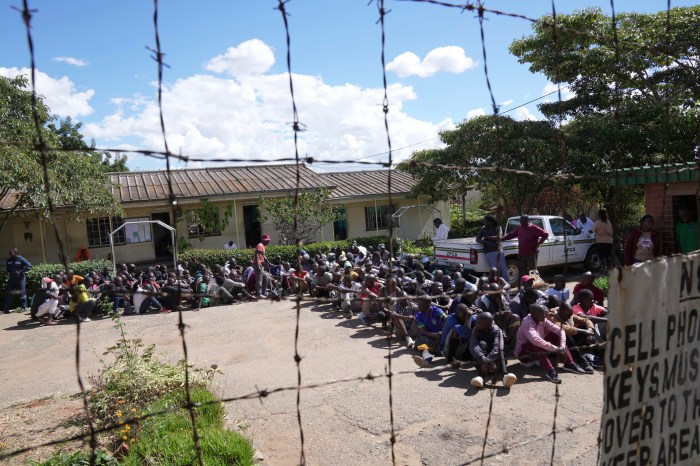LONDON – The pay isn’t great, the job is temporary and you could be a target for terrorists. But when Mabel Cross heard that she might be able to work at the 2012 Summer Olympics, she rushed to get to a London recruitment centre early.
Immaculate in a navy suit and pink shirt, Cross painstakingly filled out forms Thursday in hopes she could be part of a vast new Olympic workforce. The recruitment effort at a school just outside the Olympic stadium in East London is the most visible signal yet that organizers are ready to stop building arenas and start delivering sports events.
“I wish I could be successful,” the 52-year-old said in a voice just above a whisper. “I would be so interested to work for the Olympics.”
Some 10,000 security guards are needed and organizers have already received three times that number in applications from around the country. The guards will work alongside British police and the military to deliver a robust — and expensive — security operation involving about 23,700 people.
Planners are also moving to finalize security, ticketing and transport plans despite a series of setbacks that have pushed costs higher.
“We’re switching from planning stuff to really doing it,” said organizing committee chief executive Paul Deighton.
While Britain’s total cost for the event remains at 9.3 billion pounds (C$14.6 billion), auditors say there’s little wiggle room for the unexpected. The budget for the Games is “finely balanced,” with less than 0.4 per cent of the total left to cover unforeseen expenses, the National Audit Office has said.
If anything unexpected and expensive happens, Olympic officials will have to ask British taxpayers, already struggling in tough economic times, for more money. Paying more for the Games would not enhance their popularity among a public already angered by a complex, computerized ticketing system that was riddled with glitches and left many people unable to attend.
Part of the reason for the budget worries is that security costs have continued to rise. British officials last month doubled the funding for security operations at venues, raising overall security costs to more than 1 billion pounds (C$1.6 billion).
London Olympic organizing committee chief Sebastian Coe assured The Associated Press in an interview that the Games were on track and will stay in the black.
“Occasionally some things are slightly more than you expect,” he said, speaking at the World Economic Forum in Davos, Switzerland. “On a lot of occasions, they’re slightly less than you expect, but overall those changes have taken place within that 9.3 billion-pound envelope.”
Coe vowed that glitches in the ticketing process were being ironed out before the next batch go on sale in April. About 1.9 million people made 24 million ticket applications for the six million tickets available.
Most of the construction work is finished, with centrepiece arenas like Olympic Stadium and the saddle-shaped swimming venue visible for miles. London Mayor Boris Johnson has even taken in the view of Olympic Park from the platform on the almost-finished Orbit, a ruby red sculpture that towers over the stadium.
On weekends, the site can even get quiet — with no beeping construction vehicles backing up.
Work crews are now focusing on details. Ecologists have reintroduced newts to the park. Bats have taken up residence. Even in a bleak London winter, grass has taken root.
Yet in London’s famous Underground subway system, things remain more unsettled. Transport planners say the number of trains will increase on the Jubilee Line, one of two key subways that will serve both central London and Olympic Park. Subway travellers will notice changes.
Nigel Holness, the network service director for London Underground, took The Associated Press on a behind-the-scenes tour recently. Standing beside the driver’s seat of a subway train, he spoke as the train slipped through the dark tunnels to stations near some of the city’s biggest landmarks — Westminster, Waterloo, London Bridge.
“The Jubilee line is absolutely the heart of what we’re doing for the Olympics,” he said.
The Jubilee is also a huge question mark in a strained system. Around 6.5 billion pounds (C$10.2 billion) has been invested in upgrading and extending transport links. The Jubliee, among the newly upgraded lines, marked on London transport maps by a swish of silver.
If the Jubilee has troubles, many spectators trying to get to the Games will, in the daily parlance of the London Underground, be forced to “seek alternative routes.”
Some 25,000 reporters are expected to land in London for the Games and they won’t hesitate to make comparisons to Atlanta’s 1996 Olympics — where bus drivers got lost, commuters waited hours for trains and athletes nearly missed events. It was so bad in Atlanta that the International Olympic Committee began requiring host cities to make sure their transport systems could deal with the strain.
No one is more aware of the consequences of failure than Holness, who can reel off statistics at will on the improved performance of the Jubilee line. He notes the subway trains are faster than ever — by a minute and a half. They are coming at greater frequency. More of them will be in service at any one time. Switching systems have been improved.
“There will be challenges during the Olympics,” he said. “We will be carrying an additional 500,000 people a day. We’re working hard to manage that demand.”
Challenge is a word heard often lately. Deighton described the hiring of security guards — the “massive mobilization” — as critical to efforts to leave a lasting mark on parts of East London, a neglected area known for its once-thriving but long-derelict shipyards, its dirty canals, slaughterhouses and toxic waste dumps.
Work — even if it is temporary — really matters, especially in these times.
“Jobs change lives,” Deighton said.
____
Associated Press Writer Pan Pylas contributed to this story from Davos.















